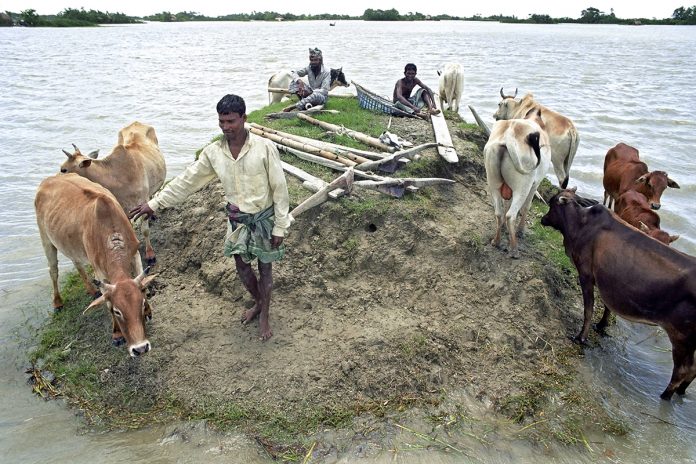GEOGloWS is delivering actionable water information from global models for use in local decision-making, E. James Nelson, Professor at Brigham Young University explains
Better management of the world’s water supply requires accurate data of historical hydrologic conditions and forecasts to provide understanding and warnings of devastating events such as droughts and floods. The GEOGloWS partnership is doing this through services that provide water intelligence to local stakeholders that are useful in making decisions about these water management and security issues.
The world’s water supply
Water is the world’s most precious natural resource. A limited supply of freshwater supports the global food chain, sustains human life and the power industry. At a time of worldwide population growth and increasing water stress due to climate change, effective management of this critical resource is key to ensuring food security, avoiding conflict and promoting sustainable development. Human behaviour needs to be modified to reduce resource unpredict-ability. Still, more importantly, innovation and technology must be developed to generate analysis ready data and provide timely and actionable information through services that help alleviate predictable stresses.
Predicting these disasters with sufficient lead time requires accurate river flows and depth measurements. However, many people who are vulnerable to water insecurity or hazards such as flooding, live in countries with limited water monitoring infrastructure or modelling capability necessary to produce good data. In many developing countries, this lack of data means that floods and droughts are difficult to predict, making their impacts far more devastating.
Computer modelling of water systems
In these areas, computer modelling of water systems can be an essential tool to fill in gaps of historical information and forecast water-related disasters. When local river gauge data are unavailable, models can use global datasets, such as observations made by satellites, to supplement water information in places where little or none exist.
However, while developed countries have access to sophisticated river flow models, developing countries can be at a disadvantage. Models are expensive to create, require specialised equipment and skills, and can be difficult to programme. Currently, available models predicting river flows at a global scale often lack enough detail to produce usable information on local scales. Previous solutions to these problems have involved donor countries funding equipment or specific technical training to develop and run local hydrologic modelling and data management systems with the power to provide information that is critical for decision-making. Unfortunately, as maintenance costs continue after the project funding ends, projects like these are not always sustainable in the long term.
GEOGloWS: Tackling water challenges
The Group on Earth Observations GEOGloWS initiative is dedicated to tackling these challenges. Along with others of the GEOGloWS international team of water experts, Professor Jim Nelson at Brigham Young University has led the creation and testing of a transformative global system for delivering actionable streamflow information. This system, the GEOGloWS ECMWF Streamflow Service, uses a Hydrologic Modeling as a Service (HMaaS) approach, which centralises the cyberinfrastructure, human expertise, and other technical components of hydrologic modelling using the best global forecasts and expertise available, along with the latest advances in Information and Communication Technology (ICT). GEOGloWS delivers reliable historical and forecast river discharge information as a service worldwide. This spares users from the difficult and expensive task of building their own models which have proven to be unsustainable in the past.
The GEOGloWS service provides water intelligence. It provides actionable information to local stakeholders that is useful in making decisions about water management problems such as flooding, drought, and water/food/ energy security issues. The forecast service can leverage local knowledge and expertise to tailor the global forecast to local applications. This interaction of global expertise and local knowledge provides a unique and complementary framework for more sustainably developing capacity and empowering local experts and decision-makers.
The list of countries where local decisions makers are accessing and using the data is growing and includes early implementers in Nepal, Bangladesh, Bhutan, Kenya, Malawi, Tanzania, Dominican Republic, Honduras, Peru, Colombia, Ecuador, El Salvador, Israel, Ethiopia, and Brazil. The information is useful as it is, but can also be used to implement national systems or strengthen locally generated modelling data. Because the system is maintained and operated as a cloud service, the vulnerability to computer and software updates or limited local capacity can be mitigated. This also overcomes the high cost of maintenance and improvement because each local user immediately benefits from investments in the global data service.
The GEOGloWS ECMWF Streamflow Service aims to provide the necessary information to decision makers that respond to droughts and floods. This has the potential to save lives and infrastructure and increase food security. It provides forecasts in areas that lack water observation data, providing local organisations with crucial information to help reduce water-related vulnerabilities.
The service provides short- and long-range forecasts for every river in the world daily, and 40-year simulated historical data so present risks can be put in context with historical extremes. For low- and middle-income countries and communities, this represents a major breakthrough as this information complements their national efforts resulting in better operation of dams, irrigation systems, and flood management. The service promotes Data Democracy and equality as every country, organisation, and citizen has access to the same information.
Please note: This is a commercial profile











